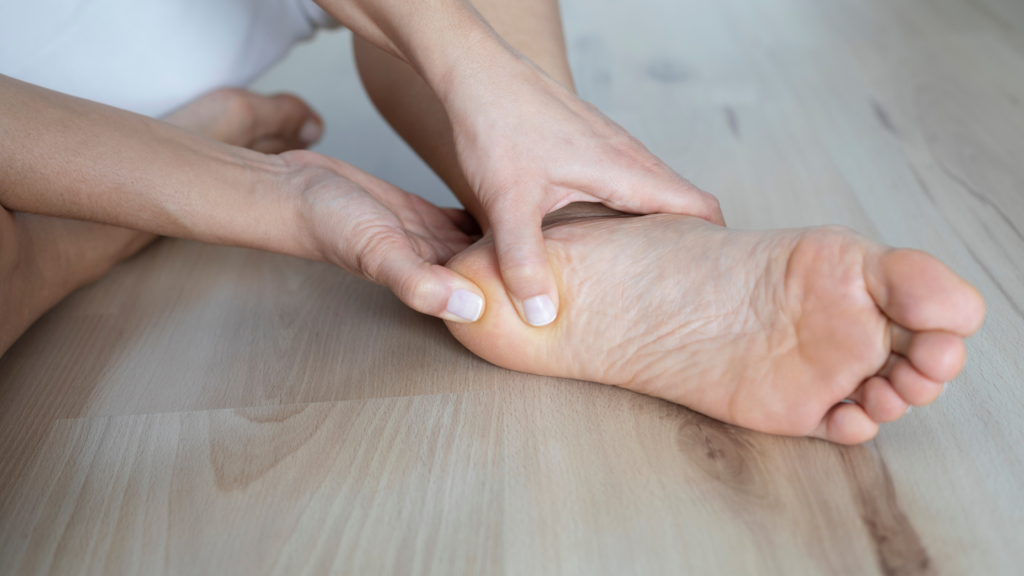
Every mile you walk puts 60 tons of stress on each foot. Your feet can handle a heavy load, but too much stress pushes them over their limits. When you pound your feet on hard surfaces playing sports or wear shoes that irritate sensitive tissues, you may develop heel pain, the most common problem affecting the foot and ankle.
The foot is the foundation of movement of the lower extremity.
If your first few steps out of bed in the morning cause severe pain in the heel of your foot, you may have plantar fasciitis (fashee-EYE-tiss), an overuse injury that affects the sole of the foot.
A diagnosis of plantar fasciitis means you have inflamed the tough, fibrous band of tissue (fascia) connecting your heel bone to the base of your toes.
There are many diagnoses within the differential of heel pain; however, plantar fasciitis is the most common cause of heel pain for which professional care is sought. Too much pressure on your feet can damage or tear the ligaments; the plantar fascia becomes inflamed, and the inflammation causes heel pain and stiffness.
WHAT ARE THE SYMPTOMS OF PLANTAR FASCIITIS?
The major complaint of those with plantar fasciitis is pain on the bottom of the heel. But some people experience pain at the bottom mid-foot area. This develops gradually over time. It usually affects just one foot, but it can affect both feet. Some people describe the pain as dull, while others experience a sharp pain. Some people feel a burning or ache on the bottom of the foot extending outward from the heel.
The pain is usually worse in the morning when you take your first steps out of bed, or if you’ve been sitting or lying down for a while. Climbing stairs can be very difficult due to heel stiffness.
WHAT CAUSES PLANTAR FASCIITIS?
You’re at a greater risk of developing plantar fasciitis if you’re overweight or obese. This is due to the increased pressure on your plantar fascia ligaments, especially if you have sudden weight gain. Women who are pregnant often experience bouts of plantar fasciitis, particularly during late pregnancy.
Occupations requiring walking or standing on hard surfaces, and running for exercise. Someone who has a foot with a very high or flat arch is also more likely to develop plantar fasciitis.
Plantar fasciitis is inflammation of the plantar fascia, either through overstretching, overuse or a medical condition.
It can be caused by:
Playing sports that put stress on the heel bone, like running, dance and aerobics.
Flat-footed or high arches.
Being middle-aged or older.
Being overweight.
Pregnancy.
Spending a lot of time on your feet.
Wearing shoes with poor arch support or stiff soles.
Plantar fasciitis is often associated with a heel spur which is a spike of bone poking out from the heel bone, but many people have heel spurs without any pain.
HOW CAN SOMEONE PREVENT PLANTAR FASCIITIS?
Recurrent plantar fasciitis can be prevented only if a specific activity is known that caused the injury of the plantar fascia. Additionally, the use of an arch support, shoe orthotics, and stretching exercises for the foot can be helpful. These measures may improve the prognosis by preventing recurrent plantar fasciitis.
WEARING CUSTOM ORTHOTICS
Your feet are the “tires” of your body. If they fail, go flat, your body doesn’t move properly.
Custom orthotics work on your feet much like glasses work on your eyes – they reduce stress and strain on your body by bringing your feet back into proper alignment.
Your feet are the foundation of your body; as you walk, run, and play, they support you and help protect your ankles, knees, hips and/or back from damaging stress. Your feet perform better when all of the muscles, arches, and bones are in their ideal stable positions. When the supportive structure of the foot is compromised, it can result in dysfunction and pain in the feet, knees and back. Custom orthotics can be the solution to enhance the structural support of your feet and eliminate your pai
WHEN SHOULD SOMEONE SEEK MEDICAL CARE FOR PLANTAR FASCIITIS?
Anyone with persistent foot pain or heel pain should seek medical evaluation.
Chronic heel or foot pain can be due to arthritis or a bone fracture. Plantar fasciitis can be treated and function restored.
TREATMENT PLAN
Here at Don Kelly Physiotherapy and Acupuncture clinic we have treated this very common condition very successfully in both our Limerick and Charleville clinics.
Phyio exercises and acupressure: This can be an ancient type of treatment that is comparable to acupuncture, but does not use needles. It applies pressure to particular pressure points which encourages blood circulation, relieves muscle tension, and triggers our body natural healing :
I have treated my patients with a 100% success rate. Armed with experience in the last 20 years of providing my physiotherapy services in Limerick and Charleville.
If you experience chronic pain, injuries, or advice for knee surgery and replacement please don’t hesitate to reach out. I have treated thousands of my patients with successful results over the last 20 years of my physio services.
BEFORE YOU SAY YES TO KNEE SURGERY REPLACEMENT– give me a ring for an assessment.
My treatment plan is the result of my experience and knowledge in treating chronic pains and injuries over the last 20 years. This is the holistic plan to guarantee pain relief, prevent recurring pains, and faster recovery.


